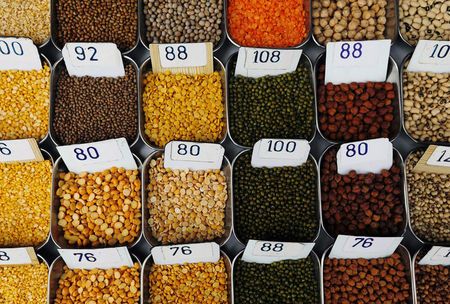After tomatoes, soaring dal prices dampen festive fervour

Price tags are seen on the samples of pulses that are kept on display for sale at a market in Mumbai,\ on January 29, 2018. (REUTERS File Photo)
New Delhi, October 3 (IANS): After tomatoes, dal is next in line to bear the brunt of spiralling prices during the festive season.
In the last one week, the price of urad dal has increased by Rs 450-Rs 850 per quintal in the major markets of the country. Along with urad, the prices of moong, masoor and chickpeas (chana) dal have also gone up.
Experts opine that pulses will be more expensive because the urad crop has suffered in Madhya Pradesh due to the incessant rain. At the same time, sowing of pulses has also been estimated to be less in this kharif season than last year.
Rajni, a resident of Delhi's Mandawali area, said that after the spike in vegetable prices, she used to manage with potatoes and lentils as the prices were low, but now pulses have also become expensive.
Earlier, chickpeas (chana) was available at Rs 55-Rs 60 per kg, but now it has gone up to Rs 65-Rs 70 per kg while chickpea lentils (chana dal) is at Rs 90 per kg.
Mumbai's Amit Shukla, a pulses market expert, said that there was a rumour in the market on Tuesday that the government is going to impose a stock limit on pulses for wholesale and retail traders, which led to a one-day fall in the prices of all pulses. But for the last one week, the prices of gram, moong and lentils have been going up.
The wholesale price of Urad's FAQ (imported from Burma) variety in the country's financial capital Mumbai on Tuesday was Rs 5,450 per quintal, which is Rs 550 more than the previous week. At the same time, the price of FAQs in the National Capital Region of Delhi was up by Rs 450 to Rs 5,400 per quintal from the previous week. The price of FAQ Urad in Chennai was Rs 5,650, UQ of SQ Variety was Rs 6,775 per quintal. In Chennai, the prices of FAQ and SQ have increased by Rs 600 and Rs 525 per quintal respectively in the last one week. The price of FAQ Urad in Kolkata rose by Rs 850 to Rs 6,200 per quintal in the last one week.
The price of moong has also increased by Rs 100-Rs 200 in various cities during the last one week. The price of Rajasthan Line Moong was Rs 6,100 per quintal in Delhi on Tuesday. In Delhi, the price of moong has increased by Rs 200 per quintal in the last one week. At the same time, the price of gram has increased by Rs 25-Rs 100 per quintal in major mandis of the country in the last one week. In Ganj Basoda, Madhya Pradesh, the price of desi gram increased by Rs. 100 to Rs. 4,100 on Tuesday. The price of Lemon Tur in Delhi was Rs 5,300 a quintal and there has been no significant change in the price in the last one week.
During the crop year 2018-19 (July-June), the total production of all pulses was estimated to be 234.8 lakh tonnes, while traders indicated that the total consumption of pulses in the country was around 240 lakh tonnes.
Not only this, in the current crop year 2019-20, the production of Kharif pulses could be 82.3 lakh tonnes in 2019 as compared to 92.2 lakh tonnes in 2018.
President of the All-India Dal Mill Association, Suresh Agarwal told IANS that the government agency National Agricultural Cooperative Marketing Federation of India Ltd (NAFED) has a full stock of red gram and Bengal gram and also the new crops of red gram will arrive in November-December.
Madhya Pradesh has received non-stop rain for 40 days which has damaged the fields and the crop. It also affected the crop of green gram and black gram by 25-30 per cent. If the rain continues in the state then black gram and green gram might suffer further losses and their prices might increase by 5-10 per cent.






